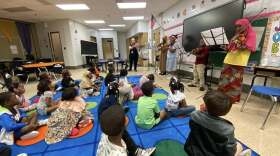With hopes of passing a charter schools bill out of the legislature by the end of the day, the Senate Education Committee Wednesday approved last-minute changes to a bill that would allow the organizations to open up across the state.
Gov. Matt Bevin showed up to the committee to once again throw his support behind the bill.
“It’s hard for me to imagine that it’s needing a debate at this point,” Bevin said. “This idea that some would say ‘well we’re not ready, we haven’t had time, we haven’t studied it.’ Really?”
Charter schools would be exempted from state regulations that apply to traditional public schools — supporters say this provision would allow charters to innovate and provide better education for students.
Under the new version of the bill, charters would be required to “hire only qualified teachers to provide student instruction”— addressing a concern that charters would be exempted from doing so.
Sen. David Givens, a Republican from Greenville, said the new version of the bill will also prevent charters from "cherry picking" the most-qualified students from traditional public schools.
“When we build into that lottery explicit language that says that lottery must reflect the application, we think we’ve arrived at a place of comfort that there will not be cherry picking,” Givens said.
Givens said the issue will be addressed by language requiring charters to conduct student admission lotteries “in accordance with targeted student population and service community” as identified in their charter applications.
The bill states that teachers, parents, school administrators, community residents, public organizations, nonprofit organizations, “or a combination thereof” can apply for charters.
Local school districts would be in charge of authorizing charter schools, though denials could be appealed to the state board of education. The new version of the bill clarifies that the mayors of Lexington and Louisville — not including unincorporated cities within Louisville's boundaries — can also authorize charter schools.
Rep. Reginald Thomas, a Democrat from Lexington, asked Givens to include language explicitly preventing for-profit companies from applying to form charters.
Givens denied the request, but said the bill already prevents for-profits from forming charters.
"I think the difference between public and private is largely going to be as we understand the definition of public organization," Givens said after the hearing. "It is defined as a governmental entity."
The bill does not explicitly define "public organization."
The new version of the bill also makes it harder to form conversion charter schools — public schools in which 60 percent of parents vote to turn the institution into a charter school.
Under the changes, schools that are in the bottom 5 percent of performers would be able to move forward with conversions in that manner, but better-performing schools would have to have approval from the local school board after the vote.
After the meeting, Givens said that there will likely be a bill late Wednesday that would address how charter schools are funded.
The state Senate will likely take up the charter schools bill late Wednesday. If the measure passes, the House will have to approve any changes before the legislation heads to Gov. Bevin's desk.





